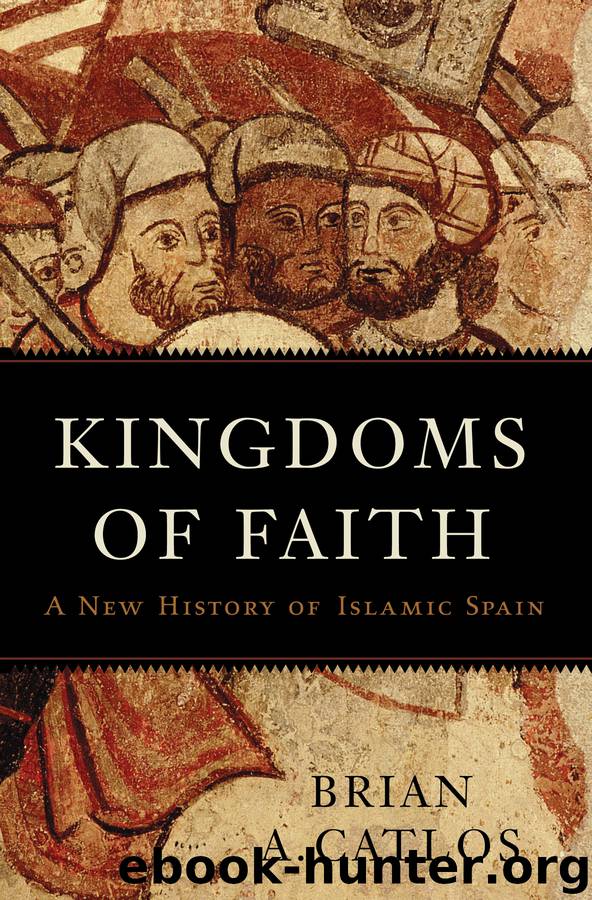Kingdoms of Faith by Brian A. Catlos

Author:Brian A. Catlos
Language: eng
Format: epub
Publisher: Basic Books
Published: 2018-01-05T05:00:00+00:00
The “Palace of Pleasures” (Aljafería Palace, Zaragoza); exterior. Turol Jones, 2004 (Creative Commons)
Under his patronage, Zaragoza became an important center of both Arabic and Hebrew letters and home to such literary giants as the poets and grammarians Muhammad ibn Bajja (“Avempace,” to the Latin world) and the Jew Solomon ibn Gabirol (who worked mostly in Arabic). Like so many of their fellow Zaragozan men of letters, these two were also physicians and intellectual polymaths: Ibn Bajja, a philosopher, composer, and astronomer, and Ibn Gabirol, a philosopher and grammarian. In fact, the city was most famous as a center of mathematics, astronomy, medicine, and philosophy. It was home to a score of leading twelfth-century Muslim and Jewish scholars who had been swept up by both the rationalistic Aristotelian revolution and the revival of Neoplatonism that were transforming the theological and intellectual landscape of the Islamic world and that would soon provide the foundations for the European Renaissance and the new esoteric movements that developed in all three of the Abrahamic religions.
Al-Muqtadir’s son and successor, Yusuf al-Mu’taman, who came to power in 1081/2, was himself one of the most notable mathematicians of his age and emulated his father’s support of the sciences. Zaragoza continued to produce top-ranked scholars even as it began to unravel politically in the late eleventh century. Jewish intellectual life was particularly robust in the city. Abu ‘l-Hasan Judah ha-Levi, the author of the anti-Aristotelian Jewish apologetic the Kitab al-Khazari (“The Book of the Khazar,” also known as “The Book of Proof and Defense of the Despised Religion”), lived here. So did his close friend, the poet, exegete, and grammarian Abraham ben Ezra (or Abu Ishaq), regarded second only to his contemporary, the great French rabbi Rashi, for his Biblical commentaries. Abu Fadl ibn Hasday, a poet, musician, astronomer, and mathematician, and a grandson of the great Hasdai ibn Shaprut, was a favorite of al-Muqtadir and al-Mu’taman. He served them as katib and wazir and eventually converted to Islam, supposedly out of love, but more likely to advance his career. But if Abu Fadl chose Islam, others would convert to Christianity as the balance of power in the region shifted toward the north. The most notable was Moses Sephardi, baptized in 1106 as Petrus Alfonsi, who wrote both a compilation of Near Eastern fables called the Disciplina Clericalis and a seminal anti-Jewish tract, The Dialogue Against the Jews. In 1116, he became physician to Henry I, king of England.
But for all the cross-cultural collaborations that characterized the court of the Banu Hud, one of the most curious and portentous exchanges took place between an anonymous Christian cleric and the philosopher Abu’l-Walid Sulayman ibn Baji sometime in the early 1070s. Details are sketchy, but it seems that two Christian monks arrived in Zaragoza from Frankish lands and delivered a courteous, formal letter “to the beloved friend… the noble king,” al-Muqtadir, politely excoriating Islam as an invention of the Devil and inviting him to convert to Christianity.32 The author did not disclose his identity, but it may have been (the later Saint) Hugh the Great, Abbot of Cluny.
Download
This site does not store any files on its server. We only index and link to content provided by other sites. Please contact the content providers to delete copyright contents if any and email us, we'll remove relevant links or contents immediately.
| Africa | Americas |
| Arctic & Antarctica | Asia |
| Australia & Oceania | Europe |
| Middle East | Russia |
| United States | World |
| Ancient Civilizations | Military |
| Historical Study & Educational Resources |
Room 212 by Kate Stewart(5125)
The Crown by Robert Lacey(4817)
Endurance: Shackleton's Incredible Voyage by Alfred Lansing(4784)
The Iron Duke by The Iron Duke(4360)
The Rape of Nanking by Iris Chang(4214)
Joan of Arc by Mary Gordon(4115)
Killing England by Bill O'Reilly(4005)
Say Nothing by Patrick Radden Keefe(3988)
I'll Give You the Sun by Jandy Nelson(3448)
Shadow of Night by Deborah Harkness(3370)
Hitler's Monsters by Eric Kurlander(3343)
Mary, Queen of Scots, and the Murder of Lord Darnley by Alison Weir(3210)
Blood and Sand by Alex Von Tunzelmann(3205)
Eleanor & Park by Rainbow Rowell(3178)
Darkest Hour by Anthony McCarten(3133)
Margaret Thatcher: The Autobiography by Thatcher Margaret(3083)
Book of Life by Deborah Harkness(2939)
Red Famine: Stalin's War on Ukraine by Anne Applebaum(2935)
The One Memory of Flora Banks by Emily Barr(2864)
